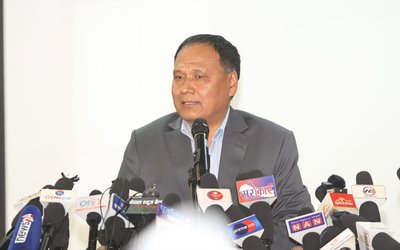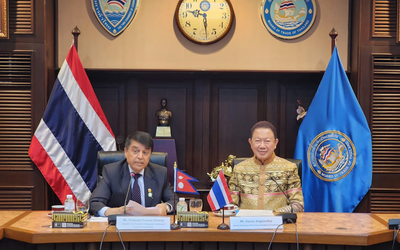
Leading the largest community groups of above 50 million, Apshara Chapagain, chairperson of FECOFUN, has a reason to rejoice. She shared her plan with 500 plus national assembly members, who came to the capital to take part in their sixth meeting, got it endorsed through her election to the post.
"I will fight against anybody who works against the spirit of community forestry," thundered Chapagain, the first woman to lead the largest community group in Nepal. "We have already shown to the world how a community can successfully manage forests. The time has come now to show that the community forestry can also be used as a tool to eradicate poverty and uplift the life of the marginalized communities."
With applauds and claps from the delegation members, chairperson Chapagain asked the users to isolate fake users, who have been making efforts to discredit the globally renowned community forestry in Nepal. "We will not support those user groups which are involved in illegal activities," said Chapagain, who spent almost a decade of her life visiting 75 districts on foot and interacting with a large number of members. FECOFUN has now over 18,000 members.
Having gone through many ups and downs, Nepal's community forestry is now an internationally known initiative. This is the reason Beijing based Asia-Pacific Network for Forest Management and Rehabilitation APFNet has also been supporting Nepal in the area of sustainable forest management and use of the forest resources to uplift the life of rural people.
Promoting inclusive community and good governance as the basis for a strong organization, the assembly members backed the central leadership of FECOFUN in the recently concluded sixth national assembly in Kathmandu.
It is inclusive because it has held its convention and assembly regularly and the leadership is chosen from balloting. When the country has failed to hold elections, FECOFUN has already set a sort of record. In its 17-year history, FECOFUN has already held its sixth assembly meeting and four general conventions.
In the last two decades, community forest users groups in Nepal have transformed the barren mountains into green forests. Following a massive deforestation in the hills and plains, the government came to the communities to preserve the woods.
"After one and a half decade long efforts, we are able to revitalize and regenerate the forest in Dhankuta," said Panthi Maya Rai, 65, who was conferred an honor for her role in preserving the forest project.
Despite the contributions of the users in forest management, the government often tries to intervene them in the management by bringing various legal and regulatory changes in the current act.
In 2010, the CFUGs launched a series of protests against the government’s move seen as a means to curtail the rights and access of the local communities over their forest resources. The government often tried to intervene in community forestry in the name of transparency.
"Community Forest User Groups have contributed to green our mountains. The time has come now for them to use the resources to uplift the life of poor people," said Krishna Chandra Paudel, secretary to the Ministry of Forest and Soil Conservation. "The government does not have any intention to intervene in the community forests, but the time has come to share the resources among the rest of the population.”
Forest Minister Yedu Bansh Jha inaugurated the assembly where leaders from major political parties and civil society members delivered their views. "The FECOFUN will fight tooth and nail against any effort to intervene in the community forests," said Ganesh Karki, general secretary of FECOFUN.
"FECOFUN is very thankful for the people from various organizations who have provided their support for the movement and expressed their solidarity during the period. However, it will still need further support and solidarity in the days to come for strengthening community people's rights in forest resources," said Karki.
According to the UN Food and Agriculture Organization, heavy deforestation began in the 1950s due to politics, poor management and socio-economic pressures. In 1964, forests covered more than 45 percent of Nepal’s total land area, while today that figure is closer to 29 percent, according to Nepal’s Department of Forest Research and Survey.
Despite this, many experts believe a trend of forest degradation is slowly being reversed through the involvement of local communities and the development of more sustainable policies.
Today, community forestry covers 1.6 million hectares, or a quarter of all forestland in Nepal, mostly in the country’s mid-hills, which are squeezed between the mountainous north and the southern plains. Some 18,000 associations known as community forest user groups (CFUGs), made up of more than two million households, manage these areas.
Communities were able to remove dying trees and cut branches for subsistence-level economic activity, such as selling firewood, but as the forests matured, their “full productive potential” went underutilized. As a result, the focus on conservation needs to shift, said Krishna Chandra Paudel, secretary at the Ministry of Forest and Soil Conservation, who calls for government-assisted commercialization of community forests.
More recently, the government has proposed amendments to the Forest Act of 1993 that would reduce user-group autonomy, according to a 2012 policy note by the local think tank Forest Action. Many amendment provisions are intended to discourage timber sales, reducing community income from the forests and hampering local development, the paper said.
The Ministry of Forest and Soil Conservation’s Paudel insists the government is not encroaching the autonomy of community groups, it is only trying to prevent illegal logging, unsustainable lumber harvesting and overall corruption in forest management in order to preserve forests and livelihoods.
With the mandate of sixth general assembly, the task before chairperson Chapagain is to protect the rights of community user groups and meet the challenges posed by Climate Change.
- IME GROUP: Expands Into Paper Industry
- Mar 24, 2025
- CPN UML: Instigated By India
- Mar 23, 2025
- ADB’S CHIEF ECONOMIST: Nepal Reduces Poverty
- Mar 11, 2025
- FM DR. DEUBA: A Successful Visit
- Mar 11, 2025
- MD GHISING: Target Of Personal Grudge
- Mar 09, 2025















